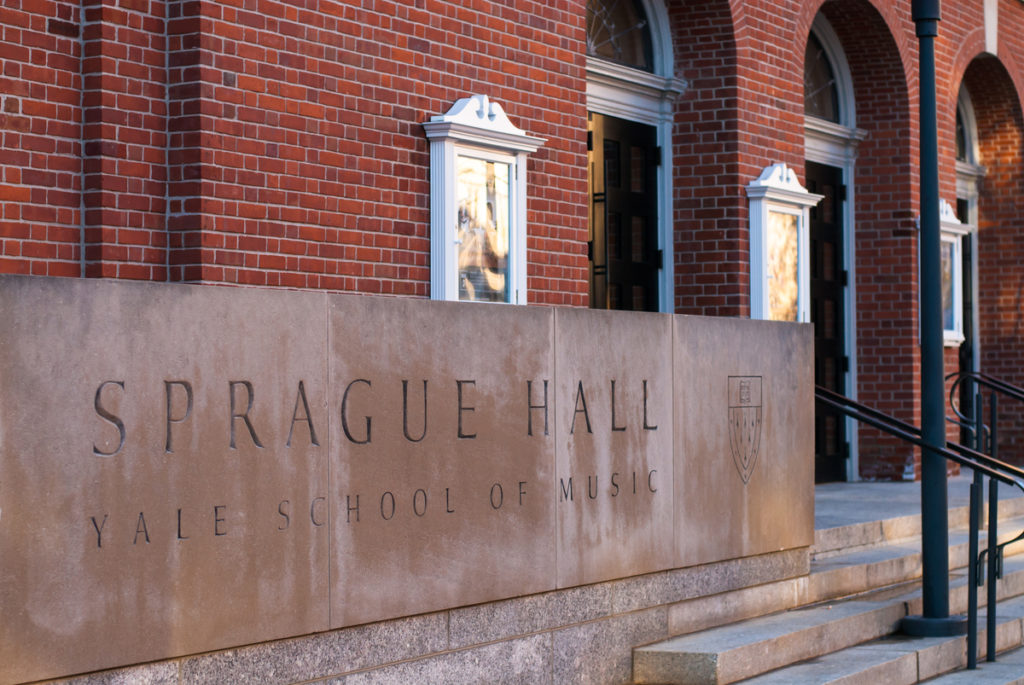Yale School of Music reopens to the public with “New Music New Haven” concert
On Thursday, School of Music students will perform pieces written by composition students and faculty composer Martin Bresnick.

Yale Daily News
Large performances at the Yale School of Music will reopen to the public Thursday with the second “New Music New Haven” concert of the semester.
The concert forms part of the “New Music New Haven” series, which takes place three times per semester and solely features pieces composed by students and faculty at the Yale School of Music. The audience will hear music from faculty composer Martin Bresnik and Matiss Cudars MUS ’23, Julián Fueyo MUS ’23, Sophia Jani MUS ’22, Udi Perlman MUS ’26, Harriet Steinke MUS ’22 and Benjamin Webster MUS ’23.
“The New Music New Haven concert series are designed to represent our fine graduate students of composition in their work and also to represent, from time to time, some of the faculty that teaches the students — in this case, me,” Bresnick said. “This new music is made by people of a young generation, just exploring the world of music. I think people will think that this music is beautiful. It’s moving. It’s thought provoking. It’s music that is necessary. We need this music.”
Steinke’s piece “Hymnal” will be performed by a voice and chamber ensemble. The text for the piece is by American poet Alessandra Lynch. While studying English at Butler University, Steinke took Lynch’s poetry classes and worked alongside her, becoming instantly drawn to the “distinctly musical” characteristics. In “Hymnal,” Steinke explores Lynch’s work, describing her “beautiful” text as the piece’s muse.
“I hopefully portrayed them in my piece as well,” Steinke said.
Fueyo’s piece is titled “Cantica Gelidæ.” According to Fueyo, he has always been interested in ancient aesthetics and their place in the rapidly-changing contemporary culture. As he was reading the poem “De Rerum Natura,” or “On the Nature of Things,” by the ancient Roman poet Lucretius, he was struck by a series of lines about the human desire to memorialize and perpetuate the voice in time both literally and allegorically. Using it as his inspiration, Fueyo wrote a song exploring that text for a bass singer — basso profondo — and electronics generated in real-time by processing the singer’s voice — “live electronics.”
With the help of live electronics, Fueyo’s music explores humans’ relationship with time. The audience will hear the singer’s voice live, which will first be echoed by the electronics half a second later, multiplied by a vocoder, fragmented by a granulator and sustained indefinitely via reverb. Through this process, Fueyo aims to convey the idea that memory is materialized through sound as the singer’s voice is sustained or fragmented into micro-looping bits of sound.
“Inevitably, echo and other electro-acoustic sounds accumulate to the degree that the singer’s words become unintelligible, forcing the singer to come to terms with the impermanence of his voice,” Fueyo said. “As the world moves into uncharted territory, technologically, politically, and anthropologically, so do culture and behavior. This piece is a meditation on memory, idealization, historicism, and the human desire to transgress them, as I hope to better understand it myself.”
Bresnick’s piece is called “Bitter Suite.” According to Bresnick, there is a “very special” beginning point for this music. He received a commission from an organization in Manhattan that was interested in seeing if they could revive a place in a modern context for old Yiddish folk songs. His aunt was a folk singer from the area, which established his close connection with the material. After completing his work, which was based on an older song placed in a new context, Bresnick became inspired by the process of revisiting older songs that he already knew and placing them in a different light. Thus, Bresnick composed three more pieces to make four in total. Each of the pieces has folk at its center and reevaluates how people can understand them in a modern context.
“I found it a challenging, but also a very touching way to remain in contact with some part of my own past that I don’t usually reveal,” Bresnick said.
While naming the piece, Bresnick chose to make a play on the word “sweet.” “Suite” refers to works that are put together — such as English and French suites of composers like Bach.
Concertgoers must reserve tickets online in advance of the show due to capacity limits. Audience members will also be asked to show proof of vaccination and photo ID at the door and wear an ASTM or N95-equivalent mask at all times when inside the building. Reservations will close an hour before each concert.
“I’m really excited for the concert,” Steinke said. “New music is such an important thing — to be able to hear music by people that are alive right now and living in the same world that you’re living in. Especially right now, when so many things are happening in the world. To be able to experience the art that other people are making with whom you’re living at the same time is super special.”
Morse Recital Hall is located at 470 College St.







